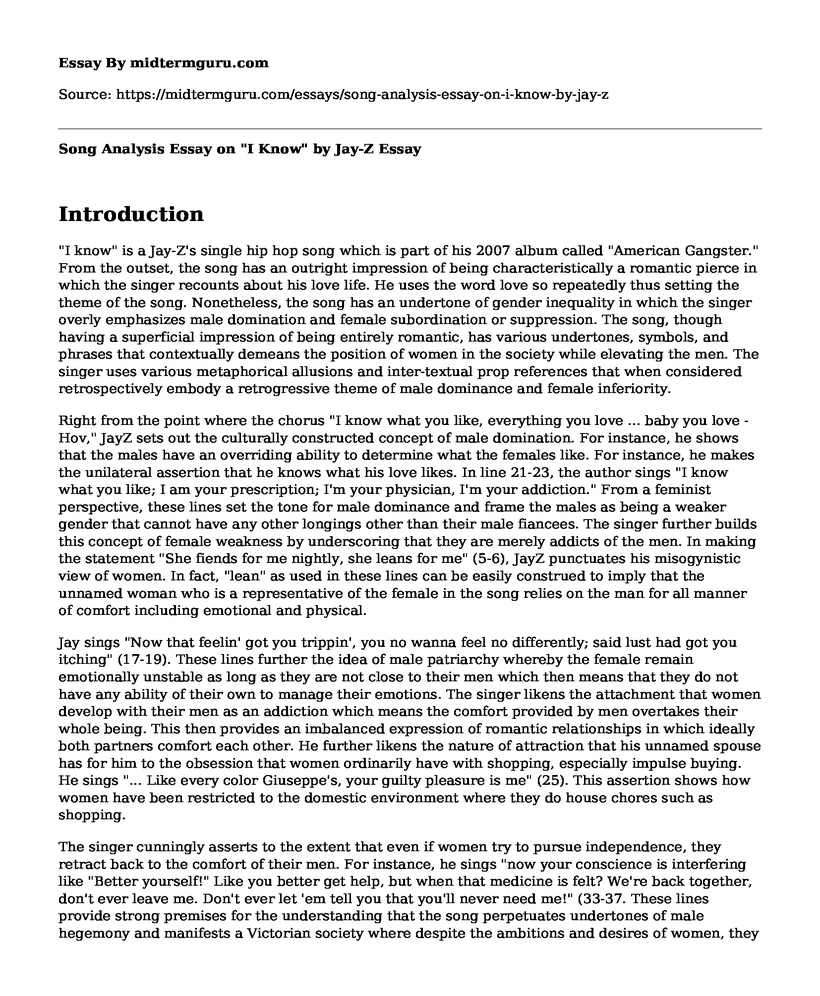Introduction
"I know" is a Jay-Z's single hip hop song which is part of his 2007 album called "American Gangster." From the outset, the song has an outright impression of being characteristically a romantic pierce in which the singer recounts about his love life. He uses the word love so repeatedly thus setting the theme of the song. Nonetheless, the song has an undertone of gender inequality in which the singer overly emphasizes male domination and female subordination or suppression. The song, though having a superficial impression of being entirely romantic, has various undertones, symbols, and phrases that contextually demeans the position of women in the society while elevating the men. The singer uses various metaphorical allusions and inter-textual prop references that when considered retrospectively embody a retrogressive theme of male dominance and female inferiority.
Right from the point where the chorus "I know what you like, everything you love ... baby you love - Hov," JayZ sets out the culturally constructed concept of male domination. For instance, he shows that the males have an overriding ability to determine what the females like. For instance, he makes the unilateral assertion that he knows what his love likes. In line 21-23, the author sings "I know what you like; I am your prescription; I'm your physician, I'm your addiction." From a feminist perspective, these lines set the tone for male dominance and frame the males as being a weaker gender that cannot have any other longings other than their male fiancees. The singer further builds this concept of female weakness by underscoring that they are merely addicts of the men. In making the statement "She fiends for me nightly, she leans for me" (5-6), JayZ punctuates his misogynistic view of women. In fact, "lean" as used in these lines can be easily construed to imply that the unnamed woman who is a representative of the female in the song relies on the man for all manner of comfort including emotional and physical.
Jay sings "Now that feelin' got you trippin', you no wanna feel no differently; said lust had got you itching" (17-19). These lines further the idea of male patriarchy whereby the female remain emotionally unstable as long as they are not close to their men which then means that they do not have any ability of their own to manage their emotions. The singer likens the attachment that women develop with their men as an addiction which means the comfort provided by men overtakes their whole being. This then provides an imbalanced expression of romantic relationships in which ideally both partners comfort each other. He further likens the nature of attraction that his unnamed spouse has for him to the obsession that women ordinarily have with shopping, especially impulse buying. He sings "... Like every color Giuseppe's, your guilty pleasure is me" (25). This assertion shows how women have been restricted to the domestic environment where they do house chores such as shopping.
The singer cunningly asserts to the extent that even if women try to pursue independence, they retract back to the comfort of their men. For instance, he sings "now your conscience is interfering like "Better yourself!" Like you better get help, but when that medicine is felt? We're back together, don't ever leave me. Don't ever let 'em tell you that you'll never need me!" (33-37. These lines provide strong premises for the understanding that the song perpetuates undertones of male hegemony and manifests a Victorian society where despite the ambitions and desires of women, they must get approval or support from their male partners to succeed. He gives the impression that the females need men as a source of happiness, prosperity and general functioning. He further objectifies his unspecified fiancee by referring to her as his "China White." China white, in this case, represents the purest heroin. While this statement, on the one hand, seems to support the use of drugs, it also connotes the objectification of women as prized passion of men and can only become useful when the males need calming of emotions.
Conclusion
The song manifests the singer's uncanny ability to present controversial topics of modern society such as drug life and sexism in a manner that the audience relates to it. The singer uses cleverly chosen metaphors, standard instrumentation and rhythmic patterns in the song which then resonates with the audience and give a critical thinker a chance to deeply interrogate the broad facts that underlie the song's storyline. Though the song arouses vital questions about the morality of the world that the singer represents, it succeeds in demystifying serious issues dogging the society in which gender is framed to undermine the ability of a section of the community. JayZ's song aptly displays an abusive relationship in which a woman is depicted as a mere dependant and whose emotions are controlled by the man. The song provides a stereotypical status of women which then casts aspersions on the morality of the society and its commitment to gender equality.
Cite this page
Song Analysis Essay on "I Know" by Jay-Z. (2022, Sep 20). Retrieved from https://midtermguru.com/essays/song-analysis-essay-on-i-know-by-jay-z
If you are the original author of this essay and no longer wish to have it published on the midtermguru.com website, please click below to request its removal:
- Power Season 2 Episode 10 Review
- Essay on the Life of William Byrd
- Film Analysis Essay on Gangs of New York
- Critical Essay on The Rite of Spring by Igor Stravinsky
- The Phantom of The Opera - Film Analysis Essay
- Gap Between Historical Musical Knowledge to Present Day Knowledge - Essay Sample
- Movie Analysis Essay on The Spy Who Came in From the Cold







